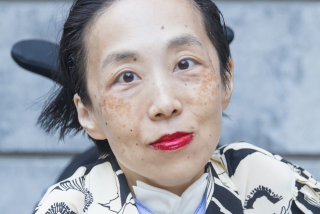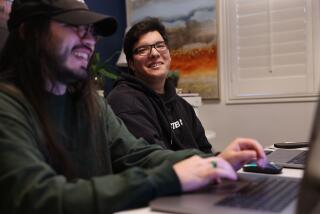Her Disability Is No Bar to Her Aid for Disabled
- Share via
It is not unlike Martha Griswold that she takes little credit for helping out Dr. David B. Rogers.
Five years ago, Rogers, a pediatrician, was driving on the Harbor Freeway to a dinner party when the tire and wheel of another car crashed through his windshield.
Rogers left the hospital months later paralyzed from the neck down. One of the first people he was told to call was Griswold. “We just talked. I have no idea really what that might have contributed,” Griswold said recently.
Rogers, now a pediatric geneticist, begs to differ. “She made plenty of contributions to my new existence,” he said.
She put him in touch with other accident victims who were willing to commiserate and offer guidance. She even loaned him her wheelchair-accessible van for a few days.
Griswold, 61, is a social worker who happens to be disabled. She is the one-woman staff and executive director of Living Independently in the Valley--LIV, a nonprofit agency based in Pasadena and Altadena and serving the disabled in the western San Gabriel Valley.
Given Griswold’s worsening disability--she had to exchange crutches for a wheelchair five years ago--friends and colleagues said they are amazed at her prodigious energy.
For decades--starting long before the advent of curb cuts, wheelchair ramps and designated parking spaces--she has helped people with disabilities learn how not only to survive but to thrive.
Griswold’s clients are disabled from accidents, debilitating diseases and birth defects--such as spina bifida as in Griswold’s case. Griswold counsels and cajoles her clients, often setting up appointments for them and pushing them to follow through on tasks that initially seem impossible. And she serves as a gentle prod to local, state and federal agencies on behalf of those who seek her assistance.
“If you can help disabled people see how others--like themselves--are living their lives OK, many get the vision and start doing it,” she said.
Griswold deals with about 35 clients each month. On a recent day, she listed the people she had talked with: a homeless disabled man, the parent of a disabled child, a volunteer, clients worried about food stamps or needing an emergency attendant or looking for a job, and an attorney for the disabled.
People who know her can cite case after case in which Griswold’s help was crucial. She helped a woman obtain treatment for her HIV-infected foster daughter who is deaf and mentally retarded. On another occasion, she helped get a new wheelchair for a down-on-his-luck man whose old chair was “totaled” by a car while he crossed the street.
Unlike big government agencies or private organizations, “she is small enough that she can really listen,” said Susan Gross, a longtime friend who serves on the LIV board.
“When you’re just ‘coped-out,’ you call Martha,” said Gross, a Pasadena resident who is disabled and at times turns to Griswold. “She encourages you to keep on persevering.”
Using hand controls to drive her battered van, Griswold goes where her clients need her. She attends hearings on disabled issues, accompanies parents of disabled children to meetings with school officials, and visits schools where she talks to children about disabled people, using a doll with a leg brace as a visual aid.
Griswold’s determination and sense of commitment are nothing new. When she was a toddler, her parents moved to Southern California from Oklahoma, hoping for and finding doctors who were able to improve their only child’s condition with difficult surgeries. Her parents raised her with a sense of not being counted out because she is disabled, she said.
Educated in Glendale schools, she graduated from high school in 1947. After graduating from Occidental College, she attended graduate school at USC with the hope of becoming a Methodist minister.
But Griswold said the church was not ready for a woman--especially a disabled woman--as a pastor. In 1954, although she had successfully completed her ministerial studies, she had been passed over for ordination.
She did not press the point. Instead, she became a social worker in San Pedro, dealing with black and Latino gang members. Later, she taught at Cal State Los Angeles and worked as a job counselor for the disabled at Rancho Los Amigos Hospital.
By the early 1980s, the movement for “independent living centers”--agencies to encourage and support disabled people to function within their communities--had been in full bloom for a decade. In 1983, Griswold participated in organizational meetings with a group that wanted to start an independent living center in Pasadena. Soon after, Griswold became executive director of LIV.
LIV’s services--which are funded through grants and donations--are free to the disabled. Working from offices in her Pasadena home and at the Altadena Congregational Church, she spends much of the day on the phone.
Recently, Griswold offered support to a disabled woman who talked about surgery-related difficulties.
“Of course, I’d swear a little too,” Griswold told the woman on the phone. “It’s not that a catheter is so bad. It’s just nicer not to have to bother. Well, take care, good buddy.”
Being disabled, Griswold said, means that she sometimes feels too deeply for clients. “But (counselors) without a disability have the problem of not understanding,” she said. “They get very involved in ‘caring.’ I hardly ever describe what I do as taking care of people. I describe it as helping (them) to attain their own objectives.”
Each Thursday, she goes to North Hollywood for an appearance as co-host on the KPFK radio show “Challenge!,” which deals with disability issues. On the way to the show recently, she stopped to see a disabled elderly woman who had handwritten her autobiography.
Griswold could only stay a few minutes at the convalescent hospital, but it was long enough for her to promise to get the autobiography typed, copied and distributed among academics, students and disability experts.
“You won’t be back,” the woman said bitterly as Griswold left.
“Oh yes, I will,” Griswold said. “And I’m going to take good care of these manuscripts.”
She wheeled out of the room in her motorized chair, holding next to her the woman’s life story, bound pages encased in plastic bags.
“She will be surprised,” Griswold said. “I really will be back.”
More to Read
Sign up for Essential California
The most important California stories and recommendations in your inbox every morning.
You may occasionally receive promotional content from the Los Angeles Times.













